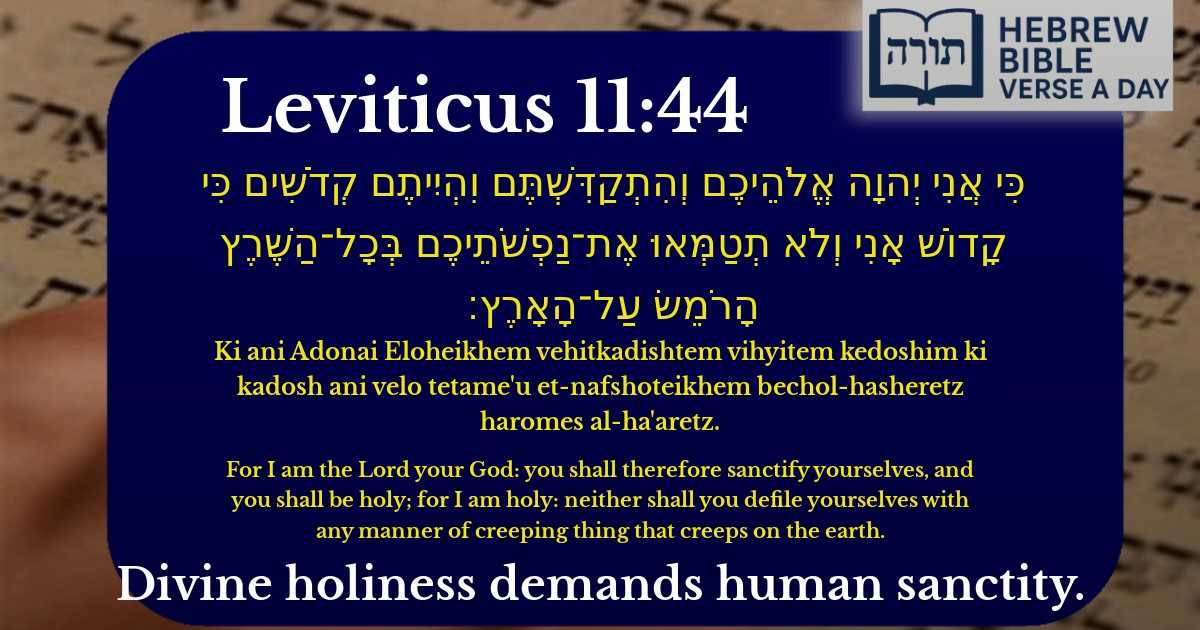Join Our Newsletter To Be Informed When New Videos Are Posted
Join the thousands of fellow Studends who rely on our videos to learn how to read the bible in Hebrew for free!
Hebrew Text
כִּי אֲנִי יְהוָה אֱלֹהֵיכֶם וְהִתְקַדִּשְׁתֶּם וִהְיִיתֶם קְדֹשִׁים כִּי קָדוֹשׁ אָנִי וְלֹא תְטַמְּאוּ אֶת־נַפְשֹׁתֵיכֶם בְּכָל־הַשֶּׁרֶץ הָרֹמֵשׂ עַל־הָאָרֶץ׃
English Translation
For I am the Lord your God: you shall therefore sanctify yourselves, and you shall be holy; for I am holy: neither shall you defile yourselves with any manner of creeping thing that creeps on the earth.
Transliteration
Ki ani Adonai Eloheikhem vehitkadishtem vihyitem kedoshim ki kadosh ani velo tetame'u et-nafshoteikhem bechol-hasheretz haromes al-ha'aretz.
Hebrew Leining Text
כִּ֣י אֲנִ֣י יְהֹוָה֮ אֱלֹֽהֵיכֶם֒ וְהִתְקַדִּשְׁתֶּם֙ וִהְיִיתֶ֣ם קְדֹשִׁ֔ים כִּ֥י קָד֖וֹשׁ אָ֑נִי וְלֹ֤א תְטַמְּאוּ֙ אֶת־נַפְשֹׁ֣תֵיכֶ֔ם בְּכׇל־הַשֶּׁ֖רֶץ הָרֹמֵ֥שׂ עַל־הָאָֽרֶץ׃
Parasha Commentary
📚 Talmud Citations
This verse is quoted in the Talmud.
📖 Yevamot 20a
The verse is cited in a discussion about the sanctity of the Jewish people and the prohibition against defiling oneself, particularly in the context of forbidden relationships.
📖 Niddah 52b
The verse is referenced in a discussion about the laws of ritual purity and impurity, emphasizing the importance of maintaining holiness.
📖 Avodah Zarah 20b
The verse is mentioned in a discussion about the prohibition of idolatry and the importance of sanctifying oneself to avoid spiritual defilement.


The Command to Sanctify Ourselves
The verse (Vayikra 11:44) begins with "כִּי אֲנִי יְהוָה אֱלֹהֵיכֶם" ("For I am the Lord your God"), establishing the foundation for the mitzvot that follow. Rashi explains that this phrase emphasizes that Hashem, who redeemed us from Egypt, has the authority to command us in matters of kedushah (holiness). The Rambam (Hilchot De'ot 1:6) teaches that this verse underscores the principle of imitatio Dei—emulating Hashem's attributes, particularly His holiness.
The Dual Aspect of Kedushah
The verse contains two related commands: "וְהִתְקַדִּשְׁתֶּם" ("you shall sanctify yourselves") and "וִהְיִיתֶם קְדֹשִׁים" ("you shall be holy"). The Sforno explains that "וְהִתְקַדִּשְׁתֶּם" refers to actively separating from physical indulgence, while "וִהְיִיתֶם קְדֹשִׁים" refers to attaining a state of inherent holiness through mitzvah observance. The Kli Yakar adds that the first is a prerequisite for the second—only by actively sanctifying ourselves can we merit becoming truly holy.
The Divine Standard of Holiness
The phrase "כִּי קָדוֹשׁ אָנִי" ("for I am holy") serves as both a motivation and a standard. The Midrash (Vayikra Rabbah 24:4) teaches that just as Hashem is separate from impurity, so too must we separate ourselves from tumah (impurity). The Ramban elaborates that this holiness is not limited to avoiding forbidden foods (as in the immediate context) but extends to all areas of life, including speech, thought, and action.
Prohibition Against Defilement
The concluding phrase "וְלֹא תְטַמְּאוּ אֶת־נַפְשֹׁתֵיכֶם" ("neither shall you defile yourselves") warns against contamination through "כָּל־הַשֶּׁרֶץ הָרֹמֵשׂ" ("any manner of creeping thing"). The Talmud (Chullin 42a) derives from here that one must not only avoid consuming forbidden creatures but also guard against any contact that could lead to spiritual defilement. The Sefer HaChinuch (Mitzvah 163) connects this to the broader idea that physical actions impact the neshama (soul), requiring vigilance in all matters of purity.
Practical Applications from Commentators